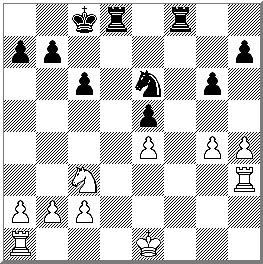

![]()
by
Edward D. Collins
| I had a lot of fun creating these
questions. I hope you enjoy them. The articles quoted in
each of the answers are all taken from the 4th edition of
the U.S. Chess Federation's Official
Rules of Chess. Note: Here is a link to the changes to the U.S. Chess Federation's Official Rules of Chess following publication of the above mentioned 4th edition. |
1) A player with just a second or two left on his clock checkmates his opponent. However, before he is able to punch his clock, his flag falls. His opponent claims a win on time.
You make the chess call.
![]()
2) A player with less than five minutes left in the current time control has an incomplete score sheet and wishes to consult his opponent's score sheet for assistance. His opponent refuses to surrender it.
You make the chess call.
![]()
3a) True or False. A player must operate the clock with the same hand that moves the pieces.
3b) True or False. A player with less than five minutes remaining in the current time control must operate the clock with the same hand that moves the pieces.
![]()
4) A player on the move picks up his piece and then accidentally drops it on an obviously unintended (but legal) square. His opponent claims that he must move it to that square.
You make the chess call.
![]()
5) A player advances a pawn to his eighth rank. He then first touches a Queen and in the act of placing it on the board, realizes that the position would then be a stalemate. He then changes his mind and places a rook on the board and punches his clock. His opponent claims that he touched a queen first and is therefore required to promote to a queen.
You make the chess call.
![]()
6) The player with the Black pieces owns a digital clock with a time delay capability and wishes to use this instead of White's "conventional" analog clock. White refuses.
You make the chess call.
![]()
7) The player with the Black pieces arrives late for his game. White has already set up the board and started the clock. Both the board and clock are standard, yet Black wishes to use his own equipment (which is also standard) and is willing to substitute his own while his own clock is running. White refuses.
You make the chess call.
![]()
8) A conflict or disagreement occurs between a player and his opponent. Is the player allowed to stop both clocks and look for a tournament director in order to get a ruling?
![]()
9) True or False. A director witnessing an illegal move being made should call attention to the fact and require the player to make a legal move unless the player's are in a sudden death time control, in which case he should remain silent.
![]()
10) True or False. In a sudden death time control, a player is not required to keep score if his opponent has less than five minutes remaining.
![]()
11) After nine moves have been made by each player, it is determined that the chessboard was incorrectly set up - a black square, not a white one, is in the nearer corner to the right of each player. White, who is down a piece, claims that the game should be declared annulled and a new one started. Black disagrees.
You make the chess call.
![]()
12) With 45 minutes left to complete all of his moves, a player accidentally makes an illegal move and punches his clock. This is pointed out by his opponent who has 50 minutes left to make all of his moves. Should the clock be adjusted?
![]()
13) A player on the move, without saying "j'adoube" or "I adjust" touches a piece by using his pinkie finger to center it on a square. His opponent claims that he touched that piece and therefore must move it.
You make the chess call.
![]()
14) White arrives at the table first and chooses to sit with his back facing the wall. Black arrives several minutes later and decides that he too would like to sit with his back facing the wall. In this tournament, the tournament director has not been stipulating which side of the table that White or Black sits on. Who is allowed to sit where they want?
![]()
15) Is a player allowed to use computer notation to record the moves of the game?
![]()
16) An adjourned game has been resumed. The envelope containing the sealed move is opened and it has been found that the sealed move, Ne5, is ambiguous... both of the player's knights can be moved to e5. The sealer's opponent claims a win based on an ambiguous sealed move. Is his claim valid?
![]()
17) A player has just four minutes remaining in a sudden death time control. He suddenly realizes that three moves ago his opponent made an illegal move. He claims that the position must be reinstated to what it was prior to the illegal move being made. Is he correct?
![]()
18) In the position below, White, intending to castle queenside, touches both his king and his queen rook at the same time. After doing so, he realizes that, because Black has a rook on d8, castling queenside is illegal. He then plays Rd1. Black claims than White must now play Ke2. (Which happens to allow the devastating knight fork Nf4+.)
You make the chess call.
